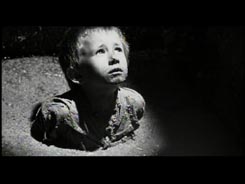DonBoy
Let me say publicly that DonBoy’s answer exudes a combination of intuitive genius and confidence that make me think DonBoy is going to do big things in his life. -- Steven D. Levitt (Freakonomics blog)
Saturday, June 18, 2005
"I think they would have been very happy to be allowed to defecate on themselves." -- Chris Wallace, Fox News, via Clever Peasantry, via several.
"Would have been"?
There's a reason Steven Spielberg put this shot in Schindler's List:

From "Women Before Hell's Gate: Survivors of the Holocaust and their Memoirs"
Another of the most common types of torture described by all of these writers is that of excremental assault. According to Harold Kaplan, the purpose of excremental assault was to produce a sense of self-disgust in the victims and thereby diminish their will to survive.18 Lucie Begov vividly describes the "Scheißkommando" as an example of this excremental assault. While imprisoned in Auschwitz, she was forced to empty large wagons filled with human excrement from latrines all over camp. The purpose of this exercise was to humiliate and degrade her and weaken her resistance to the deathly forces around her.From Terrence Des Pres' The Survivor: An Anatomy of Life in the Death Camps, which introduced that term "excremental assault" [about 1/3 of the way down that page]:
When Ruth Klüger and her mother were transported from Theresienstadt to Auschwitz, they were bombarded with another form of excremental assault. They were transported in crowded cattle cars without food, water, or any form of sanitation: "Bald stank der Wagen nach Urin und Kot, man mußte dafür Gefäße von Mitgebrachten finden, und es gab nur eine Luke um diese zu leeren." ["The wagon soon stank from urine and excrement; one had to find containers for it from the things that one had brought with, and there was only one hatch through which they could be emptied."]
It began in the trains, in the locked boxcars -- eighty to a hundred people per car --crossing Europe to the camps in Poland:There's some more at the link, and now I see there are more examples in the comments of the Clever Peasantry blog posting. Good work indeed, Chris Wallace.
The temperature started to rise, as the freight car was enclosed and body heat had no outlet...The only place to urinate was through a slot in the skylight, though whoever tried, usually missed, spilling urine on the floor...When dawn finally rose...we were all quite ill and shattered, crushed not only by the weight of fatigue but by the stifling, moist atmosphere and the foul odor of excrement....There was no latrine, no provision....On top of everything else, a lot of people had vomited on the floor. We were to live for days on end breathing those foul smells, and soon we lived in the foulness itself (Kessel, 50-51).
Everybody in the block had typhus...it came to Belsen Bergen in its most violent, most painful, deadliest form. The diarrhea caused by it became uncontrollable. It flooded the bottom of the cages, dripping through the cracks into the faces of the women lying in the cages below, and mixed with blood, pus and urine, formed a slimy, fetid mud on the floor of the barracks (Perl, 171).
The latrines were a spectacle unto themselves:
There was one latrine for thirty to thirty two thousand women and we were permitted to use it only at certain hours of the day. We stood in line to get into this tiny building knee-deep in human excrement. As we all suffered from dysentery, we could rarely wait until our turn came, and soiled our ragged clothes, which never came off our bodies, thus adding to the horror of our existence by the terrible smell which surrounded us like a cloud. The latrine consisted of a deep ditch with planks thrown across it at certain intervals. We squatted on these planks like birds perched on a telegraph wire, so close together that we could not help soiling one another (Perl, 33).
Prisoners lucky enough to work in one of the camp hospitals, therefore able to enjoy some measure of privacy, were not thereby exempt from the latrine's special horror:
"I had to step into human excreta, into urine soaked with blood, into stools of patients suffering from highly contagious diseases. Only then could one reach the hole, surrounded by the most inexpressible dirt" (Weiss,69). The new prisoner's initiation into camp life was complete when he "realized that there was no toilet paper"---
The fact is that prisoners were systematically subjected to filth They were the deliberate target of excremental assault. Defilement was a constant threat, a condition of life from day to day, and at any moment it was liable to take abruptly vicious and sometimes fatal forms. The favorite pastime of one Kapo was to stop prisoners just before they reached the latrine. He would force an inmate to stand at attention for questioning; them make him "squat in deep knee-bends until the poor man could no longer control his sphincter and "exploded", then beat him; and only then, "covered with his own excrement, the victim would be allowed to drag himself to the latrine" (Donat, 178). In another instance, prisoners were forced to lie in rows on the ground, and each man, when he was finally allowed to get up, "had to urinate across the heads of the others"; and there was "one night when they refined their treatment by making each man urinate into another's mouth" (Wells, 91.)
In Birkenau, soup bowls were periodically taken from the prisoners and thrown into the latrine, from which they had to be retrieved: "When you put it to your lips for the first time, you smell nothing suspicious. Other pairs of hands trembling with impatience wait for it, they seize it the moment you have finished drinking: Only later, much later, does a repelling odor hit your nostrils." (Szmaglewska 154)

